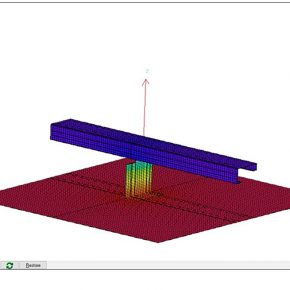
GUEST ARTICLE: Managing shortages – understanding the risks is crucial
 News that construction activity in the UK has begun to dip, due to the impact of materials shortages and rapid price inflation, is forcing some project and programme teams to take radical action to address procurement-related risks, explains Andrew Cullis, risk analyst at specialist risk management consultancy, Equib.
News that construction activity in the UK has begun to dip, due to the impact of materials shortages and rapid price inflation, is forcing some project and programme teams to take radical action to address procurement-related risks, explains Andrew Cullis, risk analyst at specialist risk management consultancy, Equib.
Coming hot on the heels of pandemic-related restrictions to working practices and supply chain disruption caused by the Suez Canal blockage and the HGV driver shortage, the uptick in construction activity during the first half of the year has exacerbated current materials shortages. The cumulative effect of these factors and the speed at which materials shortages have taken hold has caught many project teams off guard.
Mitigate the risk
To mitigate the risk of forced site closures due to breaks in supply, some project managers have taken the unprecedented step of securing their own storage facilities close to construction sites, to hold critical materials such as timber, bricks, cement, concrete and also plant and equipment. While stockpiling inventory in this way can help to keep work plans on track, it also comes with a significant price tag. As well as leasing the storage facility itself, on-costs such as additional site security and warranty costs may have to be factored in.
Another strategy that is being employed to mitigate the risk of project disruption is sourcing materials from a wider range of suppliers. In some instances, approved supplier lists have been relaxed and project managers have been investing more time in nurturing supply relationships to know where key areas of risk lie and gain access to accurate price information.
Materials shortages and the associated price increases are impacting bidding activity too. The validity periods applied to quotes for materials and services are much shorter than they were just six months ago. Quotes for aluminium and steel, for example, may only be valid for a day, with lead times for fabricated steel as long as 12-14 weeks. Quotes for other materials are valid for no more than 30 days. This is making it more difficult for contractors to quote for work, as they need to explain that costs are subject to change.
Contingency funds
With the cost of some supplies rising as much as 40 per cent in the past three months, some project managers have already found it necessary to dip into contingency funds to keep things going. For example, since the beginning of 2020, the price of timber has seen a 110 – 260 per cent increase in price, depending on factors such as the type of timber and importation schedules. In the period from January 2021 – July 2021, the cost of cladding also increased by around 25 per cent, with the cost of copper increasing by around 16 per cent. However, with rising prices and supply disruption likely to continue into the first part of next year, concern is growing that these funds may not be enough.
At a time of uncertainty, it is even more important than usual that project managers ensure that all risks are fully understood by the key decision-makers. This will require them to present risk data in the best way possible; explaining the size of each risk and what is being done to mitigate it. By escalating matters in this way, it may also be possible to re-allocate resources or materials from one project to another, to alleviate pressure on work plans.
The construction industry is resilient and while today’s materials shortages and price increases are costing projects dearly, taking the right decisions at the right time, based on accurate risk data, can help to improve outcomes.
Latest news

26th July 2024
Enfield Speciality Doors completes world-class project for Atlas Copco HQ
A rundown office and warehouse building completely transformed into a modern headquarters for Atlas Copco has been fitted with more than 120 internal fire doors from Enfield Speciality Doors.
Posted in Access Control & Door Entry Systems, Articles, Building Industry News, Building Products & Structures, Building Systems, Case Studies, Doors, Interior Design & Construction, Interiors, Posts, Restoration & Refurbishment, Retrofit & Renovation, Security and Fire Protection, Sustainability & Energy Efficiency, Timber Buildings and Timber Products, Wooden products
26th July 2024
Abloy UK launches new white paper
Abloy UK, a leading provider of security and access control solutions, has launched a new white paper.
Posted in Access Control & Door Entry Systems, Architectural Ironmongery, Articles, Building Industry News, Building Products & Structures, Building Services, Doors, Facility Management & Building Services, Health & Safety, Information Technology, Innovations & New Products, Publications, Research & Materials Testing, Security and Fire Protection
26th July 2024
MCRMA Member Profile: David Roy, Director of Roofconsult
David Roy of MCRMA member company Roofconsult has more than 50 years’ experience to draw upon working in the building envelope sector and a unique perspective on how it has changed in that time.
Posted in Articles, BIM, Infrastructure & CAD Software, Building Associations & Institutes, Building Industry News, Building Products & Structures, Building Services, Building Systems, Cladding, Information Technology, Restoration & Refurbishment, Retrofit & Renovation, Roofs, Walls
26th July 2024
Strand: Enhancing Door Functionality and Safety
Craig Fox, Sales Director for Strand Hardware, outlines how door industry professionals might apply door limiting stays…
Posted in Architectural Ironmongery, Articles, Building Industry News, Building Products & Structures, Building Services, Doors, Facility Management & Building Services, Health & Safety, Restoration & Refurbishment, Retrofit & Renovation
 Sign up:
Sign up: